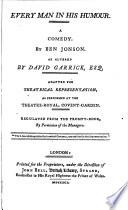Works
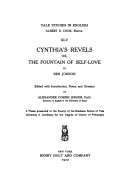
Cynthia's Revels
Ben Jonson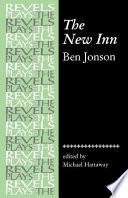
The New Inn
Ben Jonson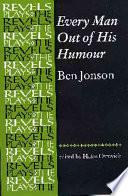
Every Man out of His Humour
Ben JonsonOn Shakespeare
Ben Jonson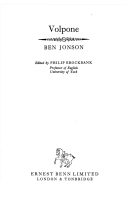
Volpone
Ben Jonson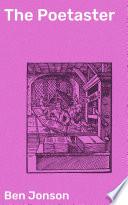
The Poetaster
Ben JonsonBartholomew Fayre: A Comedy
Ben JonsonFamous Ben Jonson Quotes
“True happiness
Consists not in the multitude of friends,
But in the worth and choice.”
Cynthia's Revels (1600), Act III, scene ii
Epode, lines 1-4
The Works of Ben Jonson, First Folio (1616), The Forest
Song, To Celia, lines 1-16; this poem was inspired by "Letter XXIV" of Philostratus, which in translation reads: "Drink to me with your eyes alone…. And if you will, take the cup to your lips and fill it with kisses, and give it so to me".
The Works of Ben Jonson, First Folio (1616), The Forest
Context: Drink to me only with thine eyes,
And I will pledge with mine;
Or leave a kiss but in the cup
And I'll not look for wine.
The thirst that from the soul doth rise
Doth ask a drink divine;
But might I of Jove's nectar sup,
I would not change for thine.
I sent thee late a rosy wreath,
Not so much honoring thee
As giving it a hope that there
It could not withered be.
But thou thereon didst only breathe,
And sent'st it back to me;
Since when it grows and smells, I swear,
Not of itself, but thee.
“Soul of the age!
The applause, delight, the wonder of our stage!”
Source: To the Memory of My Beloved, the Author, Mr. William Shakespeare (1618), Lines 17 - 24; this was inspired by a eulogy by William Basse, On Shakespeare:
Context: Soul of the age!
The applause, delight, the wonder of our stage!
My Shakespeare, rise; I will not lodge thee by
Chaucer or Spenser, or bid Beaumont lie
A little further, to make thee a room;
Thou art a monument, without a tomb,
And art alive still, while thy book doth live,
And we have wits to read, and praise to give.
Ben Jonson Quotes about time
Cynthia's Revels (1600), Act I, scene i
“Still may syllabes jar with time,
Still may reason war with rhyme,
Resting never!”
XXIX, A Fit of Rhyme Against Rhyme
The Works of Ben Jonson, Second Folio (1640), Underwoods
Epitaph on the Countess of Pembroke, reported in Bartlett's Familiar Quotations, 10th ed. (1919). This epitaph is generally ascribed to Ben Jonson. It appears in the editions of his Works; but in a manuscript collection of Browne's poems preserved amongst the Lansdowne MS. No. 777, in the British Museum, it is ascribed to Browne, and awarded to him by Sir Egerton Brydges in his edition of Browne's poems.
The Works of Ben Jonson, Second Folio (1640), Timber: or Discoveries
Referring to Francis Bacon
The Works of Ben Jonson, Second Folio (1640), Timber: or Discoveries
“He was not of an age, but for all time!”
Source: To the Memory of My Beloved, the Author, Mr. William Shakespeare (1618), Lines 41 - 50
Context: Triumph, my Britain, thou hast one to show
To whom all Scenes of Europe homage owe.
He was not of an age, but for all time!
And all the muses still were in their prime,
When, like Apollo, he came forth to warm
Our ears, or like a Mercury to charm!
Nature herself was proud of his designs,
And joy'd to wear the dressing of his lines!
Which were so richly spun, and woven so sit,
As, since she will vouchsafe no other wit.
Ben Jonson Quotes about art
“It is an art to have so much judgment as to apparel a lie well, to give it a good dressing.”
The Works of Ben Jonson, Second Folio (1640), Timber: or Discoveries
Epicene, or The Silent Woman (1609), Act I, scene i
XXIII, An Ode, to Himself, lines 1-6
The Works of Ben Jonson, Second Folio (1640), Underwoods
“If all you boast of your great art be true;
Sure, willing poverty lives most in you.”
VI, To Alchemists, lines 1-2
The Works of Ben Jonson, First Folio (1616), Epigrams
Ben Jonson: Trending quotes
Song, To Celia, lines 1-10.
Compare Catullus, Carmina V
The Works of Ben Jonson, First Folio (1616), The Forest
Context: Come my Celia, let us prove,
While we can, the sports of love;
Time will not be ours forever,
He at length our good will sever.
Spend not then his gifts in vain;
Suns that set may rise again,
But if once we lose this light,
'Tis with us perpetual night.
Why should we defer our joys?
Fame and rumour are but toys.
“Why should we defer our joys?
Fame and rumour are but toys.”
Song, To Celia, lines 1-10.
Compare Catullus, Carmina V
The Works of Ben Jonson, First Folio (1616), The Forest
Context: Come my Celia, let us prove,
While we can, the sports of love;
Time will not be ours forever,
He at length our good will sever.
Spend not then his gifts in vain;
Suns that set may rise again,
But if once we lose this light,
'Tis with us perpetual night.
Why should we defer our joys?
Fame and rumour are but toys.
Source: To the Memory of My Beloved, the Author, Mr. William Shakespeare (1618), Lines 17 - 24; this was inspired by a eulogy by William Basse, On Shakespeare:
Context: Soul of the age!
The applause, delight, the wonder of our stage!
My Shakespeare, rise; I will not lodge thee by
Chaucer or Spenser, or bid Beaumont lie
A little further, to make thee a room;
Thou art a monument, without a tomb,
And art alive still, while thy book doth live,
And we have wits to read, and praise to give.
Ben Jonson Quotes
“In each of which he seems to shake a lance,
As brandish'd at the eyes of ignorance.”
Source: To the Memory of My Beloved, the Author, Mr. William Shakespeare (1618), Lines 55 - 70
Context: Yet must I not give nature all: thy art,
My gentle Shakspeare, must enjoy a part.
For though the poet's matter nature be,
His art doth give the fashion. And that he
Who casts to write a living line, must sweat,
(Such as thine arc) and strike the second heat
Upon the muses anvil; turn the fame,
And himself with it, that he thinks to frame;
Or for the laurel, he may gain a scorn,
For a good poet's made, as well as born.
And such wert thou. Look how the father's face
Lives in his issue, even so the race
Of Shakspeare's mind and manners brightly shines
In his well-turned, and true filed lines:
In each of which he seems to shake a lance,
As brandish'd at the eyes of ignorance.
Source: To the Memory of My Beloved, the Author, Mr. William Shakespeare (1618), Lines 55 - 70
Context: Yet must I not give nature all: thy art,
My gentle Shakspeare, must enjoy a part.
For though the poet's matter nature be,
His art doth give the fashion. And that he
Who casts to write a living line, must sweat,
(Such as thine arc) and strike the second heat
Upon the muses anvil; turn the fame,
And himself with it, that he thinks to frame;
Or for the laurel, he may gain a scorn,
For a good poet's made, as well as born.
And such wert thou. Look how the father's face
Lives in his issue, even so the race
Of Shakspeare's mind and manners brightly shines
In his well-turned, and true filed lines:
In each of which he seems to shake a lance,
As brandish'd at the eyes of ignorance.
Source: To the Memory of My Beloved, the Author, Mr. William Shakespeare (1618), Lines 71 - 80
Context: Sweet swan of Avon! what a sight it were
To see thee in our water yet appear,
And make those flights upon the banks of Thames,
That so did take Eliza, and our James.
But stay, I see thee in the hemisphere
Advanc'd, and made a constellation there!
Shine forth, thou star of poets, and with rage,
Or influence, chide, or cheer the drooping stage,
Which, since thy flight from hence, hath mourn'd like night,
And despairs day, but for thy volumes light.
Volpone (1606), Act II, scene ii
CXXIV, Epitaph on Elizabeth, Lady H—, lines 3-6
The Works of Ben Jonson, First Folio (1616), Epigrams
IX, My Picture Left in Scotland, lines 1-5
The Works of Ben Jonson, Second Folio (1640), Underwoods
Act II, Scene I
The New Inn, or The Light Heart (licensed 19 January 1629; printed 1631)
“He that fears death, or mourns it, in the just,
Shows of the resurrection little trust.”
XXXIV, Of Death, lines 1-2
The Works of Ben Jonson, First Folio (1616), Epigrams
LXXX, Of Life and Death, lines 1-8
The Works of Ben Jonson, First Folio (1616), Epigrams
“Hang sorrow! care'll kill a cat.”
Act i, Scene 3. Comparable to "Hang sorrow! care will kill a cat", George Wither, "Poem on Christmas"
Every Man in His Humour (1598)
Conversations with William Drummond of Hawthornden (1711)
“Pray thee, take care, that tak'st my book in hand,
To read it well: that is, to understand.”
I, To The Reader, lines 1-2
The Works of Ben Jonson, First Folio (1616), Epigrams
“Those that merely talk and never think,
That live in the wild anarchy of drink.”
XLVII, An Epistle, Answering to One That Asked to Be Sealed of the Tribe of Ben, lines 9-10. Comparable to: "They never taste who always drink; They always talk who never think", Matthew Prior, Upon a passage in the Scaligerana.
The Works of Ben Jonson, Second Folio (1640), Underwoods
“Where it concerns himself,
Who's angry at a slander makes it true.”
Catiline His Conspiracy (1611), Act III, scene i
“A cripple in the way out-travels a footman or a post out of the way.”
The Works of Ben Jonson, Second Folio (1640), Timber: or Discoveries
“Whilst that for which all virtue now is sold,
And almost every vice — almighty gold.”
Epistle to Elizabeth, Countess of Rutland, lines 1-2. Comparable to "The flattering, mighty, nay, almighty gold", John Wolcot, To Kien Long, Ode iv; "Almighty dollar", Washington Irving, The Creole Village.
The Works of Ben Jonson, First Folio (1616), The Forest
“Folly often goes beyond her bounds; but Impudence knows none.”
The Works of Ben Jonson, Second Folio (1640), Timber: or Discoveries
“Preserving the sweetness of proportion and expressing itself beyond expression.”
The Masque of Hymen (1606)
The Irish Masque at Court (1613)
“The dignity of truth is lost
With much protesting.”
Catiline His Conspiracy (1611), Act III, scene ii
XLV, On My First Son, lines 1-12
The Works of Ben Jonson, First Folio (1616), Epigrams
“As he brews, so shall he drink.”
Act ii, Scene 1
Every Man in His Humour (1598)
“Thy praise or dispraise is to me alike;
One doth not stroke me, nor the other strike.”
LXI, To Fool, or Knave, lines 1-2
The Works of Ben Jonson, First Folio (1616), Epigrams
Conversations with William Drummond of Hawthornden (1711)
Conversations with William Drummond of Hawthornden (1711)
“There's reason good, that you good laws should make:
Men's manners ne'er were viler, for your sake.”
XXIV, To The Parliament, lines 1-2
The Works of Ben Jonson, First Folio (1616), Epigrams
“A good life is a main argument.”
The Works of Ben Jonson, Second Folio (1640), Timber: or Discoveries
Conversations with William Drummond of Hawthornden (1711)
Catiline His Conspiracy (1611), Act III, scene ii
“The burnt child dreads the fire.”
Act I, scene 2
The Devil Is an Ass (performed 1616; published 1631)
“Thus, in his belly, can he change a sin,
Lust it comes out, that gluttony went in.”
CXVIII, On Gut, lines 5-6
The Works of Ben Jonson, First Folio (1616), Epigrams
“Reader, look,
Not at his picture, but his book.”
To the Reader [On the portrait of Shakespeare prefixed to the First Folio] (1618), lines 9-10
LXX, To the Immortal Memory of Sir Lucius Cary and Sir Henry Morison, lines 65-74
The Works of Ben Jonson, Second Folio (1640), Underwoods
That Women Are But Men's Shadows, lines 1-4
The Works of Ben Jonson, First Folio (1616), The Forest
“There shall be no love lost.”
Every Man out of His Humour (1598), Act II, scene 1. Compare: "There is no love lost between us", Miguel de Cervantes, Don Quixote, part ii, chapter xxxiii
Conversations with William Drummond of Hawthornden (1711)
“Calumnies are answered best with silence.”
Volpone (1606), Act II, scene ii
“I loved the man and do honor his memory, on this side idolatry, as much as any.”
On William Shakespeare
The Works of Ben Jonson, Second Folio (1640), Timber: or Discoveries
“That Donne himself, for not being understood, would perish.”
Conversations with William Drummond of Hawthornden (1711)
The Works of Ben Jonson, Second Folio (1640), Timber: or Discoveries
“If he were
To be made honest by an act of parliament
I should not alter in my faith of him.”
Act IV, scene 1
The Devil Is an Ass (performed 1616; published 1631)
The Works of Ben Jonson, Second Folio (1640), Timber: or Discoveries

